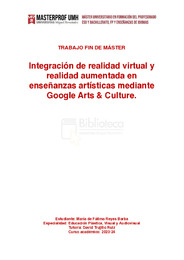Resumen :
La generación Alpha ha hecho su aparición, refiriéndonos a los actuales y
futuros estudiantes que están creciendo en un entorno inmersivo de realidad
virtual y aumentada. Estos estudiantes están desarrollando habilidades
cognitivas, actitudes y hábitos tecnológicos. Es bien sabido que un uso
excesi... Ver más
The Alpha generation has made its appearance, referring to current and future
students who are growing up in an immersive virtual and augmented reality
environment. These students are developing cognitive skills, attitudes, and
technological habits. It is well known that excessive and constant use of these
technologies can have adverse effects during the development of students, but
the educational benefits that can be obtained are not as recognized. Teachers
can integrate applications and digital content into their lesson planning, employ various teaching methodologies, and conduct assessments using digital rubrics.
In the field of artistic education, where the content is highly visual, there are
several applications that can be tools for learning, helping to obtain good results
in evaluations and projecting significant learning in students. For this reason,
this study will focus on the online platform Google Arts & Culture as an
educational tool. It will be analyzed how this platform can be integrated into the
educational context, adapting to the specific needs of each teacher and their
group of students. In addition, the ability of these applications to allow
integrated classroom programming will be evaluated, making it easier for
teachers to address different curricular aspects and competencies. If all
teachers adopt this initiative, the use of ICT can be maximized to provide
integrated and interdisciplinary knowledge between different subjects, giving
equal importance to all of them. Furthermore, the implementation of these tools
will be carried out in a global, coherent and connected manner to facilitate the
learning of new knowledge. Thus, in this research, the Google Arts & Culture
platform will be explored and analyzed in relation to artistic education,
examining the implication of virtual and augmented reality in the learning
process. A practical study will also be carried out, highlighting the integrative
capabilities of these tools without losing sight of the main objective of learning:
improving the quality and quantity of the knowledge acquired.
|
 La licencia se describe como: Atribución-NonComercial-NoDerivada 4.0 Internacional.
La licencia se describe como: Atribución-NonComercial-NoDerivada 4.0 Internacional.
.png)
